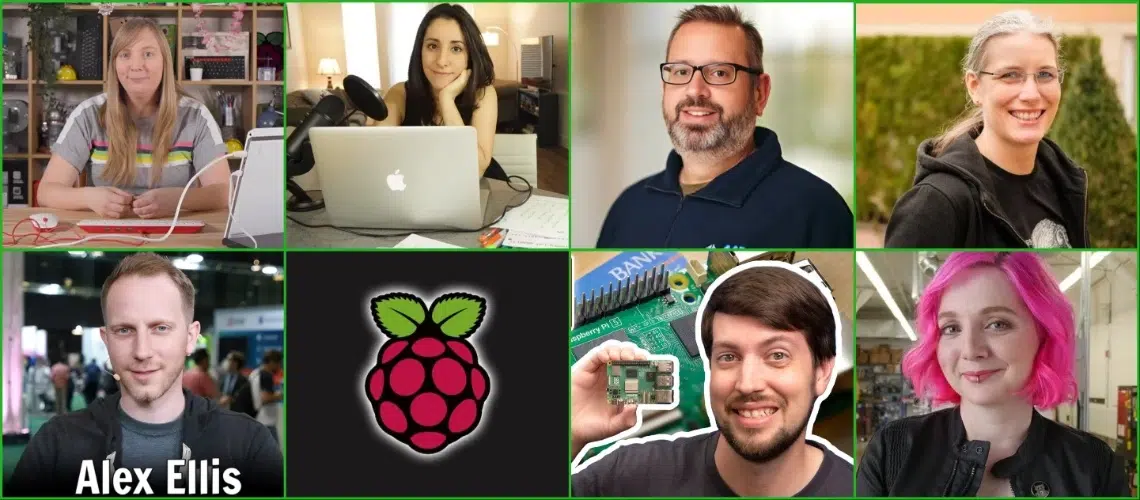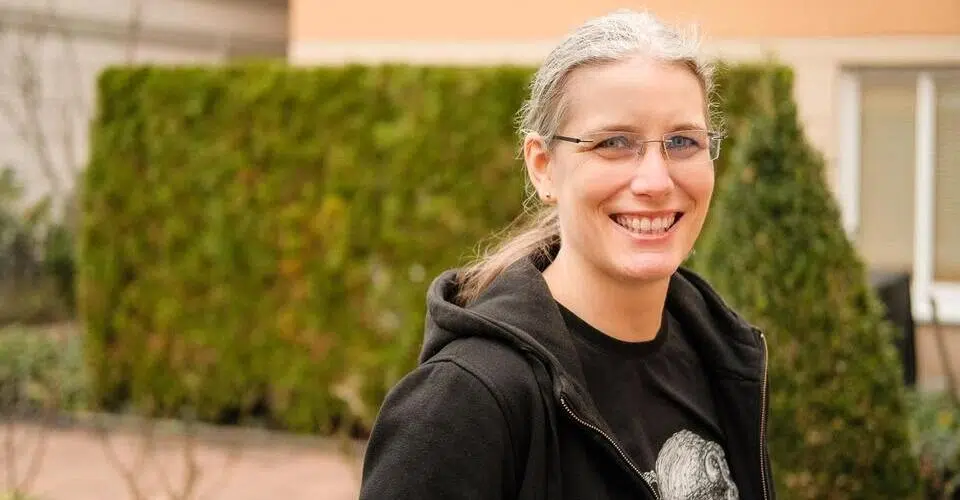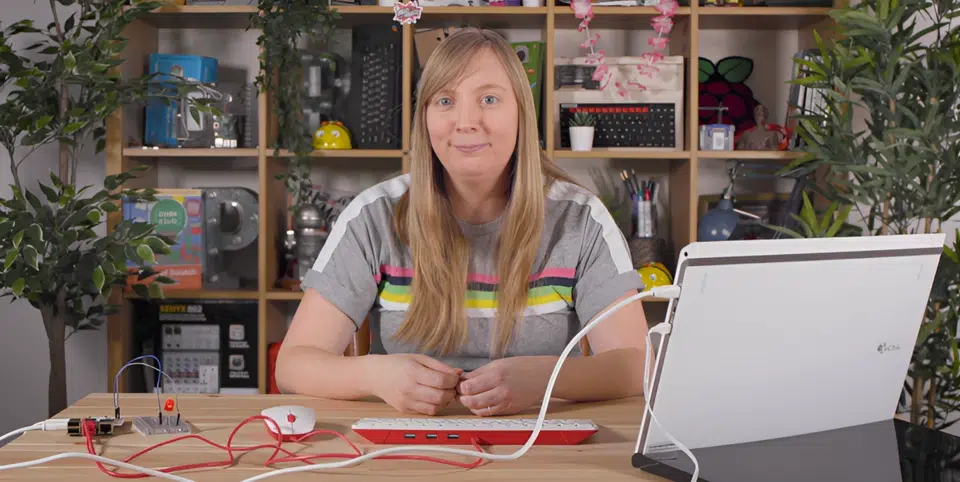21 Best Raspberry Pi Developers

Raspberry Pi’s global community is driven by inventive developers who turn this tiny board into groundbreaking solutions.
Below is a curated list of the best Raspberry Pi developers worldwide, reflecting a balanced mix of open-source contributors, startup founders, influential bloggers and content creators, tech-company engineers known for Pi projects, and even makers recognized through competitions or awards. Each has proven their impact by actively building projects with RaspberryPi and sharing their expertise with the world.
- Jeff Geerling
- Jim Bennett
- Limor Fried
- Gordon Henderson
- Ben Nuttall
- Alex Ellis
- Angus Young
- Michael Horne
- Gina Häußge
- Sam Nazarko
- Dan Schaper
- Jools Wills
- Philip Howard
- Patrick Fromaget
- Estefannie
- Dave Akerman
- Carrie Anne Philbin
- Nick O’Leary
- Arun KL
- Paulus Schoutsen
- Simon Long
Now, let’s delve deeper into their profiles and contributions.
Jeff Geerling

Nationality: American
Jeff is a prominent open-source developer, author, and content creator deeply involved in the Raspberry Pi community.
He has built an array of Pi-based projects—from Raspberry Pi clusters and custom NAS setups to creative hardware hacks and shares detailed guides on his blog and YouTube channel. Jeff’s influential book “Raspberry Pi Dramble” documents his work on a Pi Kubernetes cluster, and he’s known for helping optimize Pi’s Linux kernel for better performance. By actively contributing to projects (like Ansible roles for Pi) and transparently benchmarking new Pi hardware, Jeff has become a trusted voice for enthusiasts.
His approachable teaching style and consistent community engagement have made him a go-to resource for anyone looking to push the limits of Raspberry Pi.
- Linkedin: Jeff Geerling
- X (Twitter): @geerlingguy
- Github: geerlingguy
- Website/Blog: jeffgeerling.com
Jim Bennett
Nationality: British
Jim is a Developer Advocate who has become one of the most visible champions of Raspberry Pi usage in the cloud and IoT space. Formerly at Microsoft and now Head of Developer Advocacy at Pieces.io, Jim has authored numerous official Microsoft tutorials that integrate Raspberry Pi with Azure services.
He co-created the free IoT for Beginners curriculum, a 24-lesson course using Raspberry Pi to teach sensor interfacing and cloud connectivity. Jim’s hands-on projects bridge the gap between DIY electronics and enterprise-scale cloud computing. He is also known for engaging talks and live demos that feature Raspberry Pi as the star. Jim’s influence lies in showing professional developers that Raspberry Pi isn’t just a toy, but a viable platform for prototyping serious applications.
By blending his deep knowledge of software development with a down-to-earth, humorous presentation style, he has onboarded many traditional software engineers into the world of physical computing with Raspberry Pi.
- Linkedin: Jim Bennett
- X (Twitter): @jimbobbennett
- Website/Blog: jimbobbennett.dev
Limor Fried

Photo: betterstories.org
Nationality: American
Limor is a pioneer of the open-source hardware movement and the founder of Adafruit Industries. An MIT-educated engineer, she has created numerous Raspberry Pi add-ons and kits, empowering makers to build projects ranging from home automation to wearable
Limor’s contributions to the Pi world include designing HATs (Hardware Attached on Top boards) for sensors and displays, writing Python libraries for Pi peripherals, and producing countless tutorials through Adafruit’s learning system. As one of the first female makers to gain wide recognition, she was honored by the White House as a “Champion of Change” for expanding STEM participation. Limor remains influential by actively coding new hardware drivers for Pi, hosting live “Ask an Engineer” shows, and fostering a vibrant community around electronics.
Her relentless advocacy for open-source ideals and education has inspired a generation of Raspberry Pi enthusiasts to tinker and create.
- Linkedin: Limor Fried
- X (Twitter): @ladyada
- Github: ladyada
- Website/Blog: ladyada.net
Gordon Henderson
Nationality: British
Gordon is a veteran software engineer best known for creating WiringPi, the seminal C library that made it easy to control Raspberry Pi’s GPIO pins. Often cited as one of the Raspberry Pi world’s most influential figures, Gordon wrote WiringPi in 2012 to mimic Arduino’s Wiring APIs, enabling C/C++ and other language users to interface with hardware.
The library was instrumental in early Pi projects for robotics and home automation, and even years later many tools and bindings (for Python, Ruby, etc.) still build on WiringPi. Beyond that, Gordon has contributed to the Pi community through his blog with tutorials on electronics and by helping users on forums. He also developed the quick and simple Pixie OS for Pi and engaged in education outreach. While he officially retired WiringPi maintenance after Raspberry Pi 4, his legacy continues as others fork and update it.
Gordon’s work lowered the barrier to entry for hardware programming on the Pi, and his status as an early Pi enthusiast and community helper has made him a respected elder statesman among makers.
- X (Twitter): @drogon
- Website/Blog: drogon.net
Ben Nuttall
Nationality: British
Ben is a software engineer and educator who has significantly shaped the Raspberry Pi user experience, especially for Python developers. As a former Raspberry Pi Foundation employee, Ben led the creation of GPIO Zero, the friendly Python library for Pi GPIO, making physical computing more intuitive for beginners.
He also co-founded the piwheels project to provide pre-compiled Python packages for Pi (drastically speeding up installation of libraries). During his time at Raspberry Pi, Ben ran the official blog, wrote countless tutorials, and traveled globally to run Picademy training sessions for teachers. Now at BBC News Labs, he still stays active in the Pi scene through open-source projects and by organizing community events. Ben’s influence comes from his dual talent as a developer and a communicator: he not only built tools (GPIO Zero) that thousands use, but also explained and taught Raspberry Pi concepts to an entire generation of users.
His ongoing advocacy for accessible computing ensures Raspberry Pi remains welcoming to coders of all ages.
- Linkedin: Ben Nuttall
- X (Twitter): @ben_nuttall
- Github: bennuttall
- Website/Blog: BenNuttall.com
Alex Ellis

Photo: youtube.com
Nationality: British
Alex is a software engineer turned entrepreneur who has become a key figure in Raspberry Pi-powered cloud and edge computing. He is the creator of OpenFaaS (Functions-as-a-Service) and K3sup, open-source tools that often leverage Raspberry Pi clusters for learning and demos.
Alex gained prominence by showing how a cluster of Raspberry Pis can be used as a “pocket-sized cloud” running Docker, Kubernetes, and serverless functions. A blogger and speaker, he regularly shares projects like IoT sensor networks on Pi and tutorials on using Pi for self-hosted cloud services. Alex’s influence in the Pi space comes from bridging the gap between hobbyist experimentation and professional DevOps practices. By actively coding and maintaining projects (like Inlets for Pi-based VPN/tunneling and Pi OS optimizations for containerization), he’s enabled developers to treat Raspberry Pi as a serious platform.
His work exemplifies how Pi can empower anyone to explore cutting-edge cloud technologies at minimal cost.
- Linkedin: Alex Ellis
- X (Twitter): @alexellisuk
- Github: alexellis
- Website/Blog: alexellis.io
Angus Young
Nationality: Australian
Angus is the founder and lead author of Pi My Life Up, one of the most extensive online resources for Raspberry Pi projects and tutorials. Hailing from Tasmania, Gus has turned his passion for tech into a full-time endeavor, publishing hundreds of step-by-step guides that have helped millions of Raspberry Pi beginners.
Since 2014, he has covered everything from setting up software (like Pi-hole, Nextcloud, or Home Assistant) to hardware builds (robotics, retro arcades, etc.), all documented in an approachable style. Gus is influential for his consistency and clarity – his tutorials often rank at the top of search results, making him a first point of contact for new Pi owners. He actively keeps content up to date (crucial in the fast-moving tech world) and has expanded Pi My Life Up to cover Arduino, Linux, and more, reflecting the broadening interests of makers.
By openly sharing knowledge and never assuming prior expertise, Gus has lowered barriers to entry and grown the Raspberry Pi community globally.
- Linkedin: Angus Young
Michael Horne
Nationality: British
Michael is a long-time Pi enthusiast, blogger, and community organizer in the UK. A web developer by profession, Michael runs the blog “Raspberry Pi Pod” where for nearly a decade he has diligently reported daily Pi news, project highlights, and tutorial round-ups.
He is also co-founder of Pi Wars, the international Raspberry Pi robotics competition held in Cambridge. Through Pi Wars, Michael has encouraged teams of all ages to build Pi-powered robots that compete in obstacle courses and challenges, thus motivating learning in robotics and programming. In the Raspberry Pi community, Michael is influential as a connector and amplifier: his blogging shines a spotlight on creators large and small, and his events provide a gathering point for knowledge exchange. He has also co-authored books of Pi projects.
By blending online content creation with on-the-ground events, Michael has fostered a welcoming and creative culture around Raspberry Pi, inspiring others to share and collaborate.
- X (Twitter): @recantha
Gina Häußge

Photo: github.com
Nationality: German
Gina is the creator and lead developer of OctoPrint, the popular open-source web interface for 3D printers that often runs on Raspberry Pi. Gina started OP as a hobby project to remotely control her printer via a Raspberry Pi. It has since become an essential tool in the maker community.
She has continuously improved OctoPrint’s plugin system, UI, and compatibility, ensuring it runs smoothly even on modest Pi hardware. Gina’s influence extends beyond her code – she fosters an active community of contributors and users, and her project’s success demonstrated Raspberry Pi’s suitability for real-world server tasks. Recognized as a GitHub Star and a PSF (Python Software Foundation) fellow, Gina advocates for open-source sustainability, even securing sponsorships to fund her work.
Her hands-on development and transparent project leadership have made her an inspirational figure to both Raspberry Pi hobbyists and the wider open-source community.
- Linkedin: Gina Häußge
- X (Twitter): @foosel
- Github: foosel
- Website/Blog: foosel.net
Sam Nazarko
Nationality: British
Sam is the developer behind OSMC (Open Source Media Center), a lightweight Kodi-based operating system designed for Raspberry Pi and other devices. A self-described open-source developer from London, Sam created OSMC (Raspbmc) to turn the Pi into a full-featured media center.
He impressively released the first version while in his teens, and has since grown OSMC into a polished platform with its own custom Pi hardware (the Vero streaming box). Sam actively maintains OSMC’s Debian-based distribution, optimizing video drivers and ensuring support for new Pi models immediately upon release. He is influential for making high-quality home theater accessible with Raspberry Pi – many credit OSMC for enabling their living-room Raspberry Pi deployments. He also authored a book on Raspberry Pi media centers in 2013, demonstrating his long-standing commitment.
Balancing a startup mindset with community collaboration, Sam remains a hands-on coder and a respected authority on multimedia uses of Raspberry Pi.
- Linkedin: Sam Nazarko
- X (Twitter): @SamNazarko
- Github: samnazarko
- Website/Blog: samnazarko.co.uk
Dan Schaper
We built Pi-hole so anyone could take control of their own network — using a Raspberry Pi as a tool for privacy and empowerment.
Nationality: American
Dan is a co-founder and core developer of Pi-hole, the popular network-wide ad blocker that often runs on a Raspberry Pi. Based in the U.S., Dan helped start Pi-hole in 2015 as a passion project to block ads via DNS sinkholing.
The project exploded in popularity among Pi users and Dan has been instrumental in its growth. He specializes in the DevOps and backend development of Pi-hole, coordinating its global team of volunteer contributors. Under Dan’s stewardship, Pi-hole has evolved with a web dashboard, Docker support, and continual updates that keep it effective against ever-changing online ads. He’s influential not just for the software itself, but for showcasing how a Raspberry Pi can run critical network services reliably. Dan engages with the community on Pi-hole’s forums and GitHub, often providing support.
His work has improved online privacy for countless users and demonstrated the Raspberry Pi’s capability as an always-on network appliance.
- Linkedin: Daniel Schaper
- Github: dschaper
Jools Wills

Photo: rc-harwell.ac.uk
Nationality: British
Jools is the lead developer of RetroPie, the beloved retro-gaming platform for Raspberry Pi that has introduced countless enthusiasts to emulation. Jools has been maintaining RetroPie since its early days and guided it to become the gold standard for turning a Pi into a multi-console gaming station.
A self-employed software developer with a passion for free software, he has integrated dozens of emulators and optimized them for Pi’s ARM architecture. Jools ensures RetroPie keeps pace with new hardware and has fostered a community that contributes themes, scripts, and documentation. He still actively commits code to the project’s setup scripts and Linux kernel tweaks for better game performance. By staying approachable on forums and even creating a Patreon to support development, Jools has kept RetroPie thriving as a community-driven project.
His work exemplifies the Raspberry Pi’s ethos: taking a simple idea (playing classic games) and elevating it into a polished, accessible platform that anyone can use and even learn Linux from in the process.
- Linkedin: Jools Wills
- X (Twitter): @jools_wills
- Github: joolswills
- Website/Blog: jwills.co.uk
Philip Howard
Nationality: British
Philip is a key figure at Pimoroni and a developer of Raspberry Pi software and hardware integrations. As Pimoroni’s lead software engineer, Phil has written C++ and Python libraries for countless Pimoroni add-on boards, ensuring that hobbyists can use them easily on the Pi.
He also co-created Pinout.xyz, the handy interactive GPIO reference site for Raspberry Pi. In the community, Phil is known for his helpful presence on forums, where he assists users with technical issues. He often pushes the envelope with creative projects—like turning a Pi 400 into a USB keyboard or driving retro displays—often sharing progress on Twitter. Phil’s influence stems from enabling others: his clean and well-documented libraries have powered innumerable projects worldwide.
By manufacturing open-source hardware at Pimoroni and backing it with code, Phil “Gadgetoid” embodies the spirit of the Pi maker community, where sharing and playfulness go hand-in-hand with technical excellence.
- X (Twitter): @Gadgetoid
- Github: Gadgetoid
Patrick Fromaget
Nationality: French
Patrick is the founder and main author of RaspberryTips.com, a comprehensive blog dedicated to helping users get the most out of their Raspberry Pi. He started RT to share solutions to common Pi problems and has grown it into a one-stop shop for Pi tutorials.
His site covers a wide range of topics: basic setup, OS installations, networking and server projects, programming guides, and more – all kept very up-to-date with the latest models and OS releases. Patrick is particularly known for writing in a clear, concise manner that is accessible to non-experts, often including screenshots and step-by-step breakdowns. He also runs a YTchannel and has published an eBook compiling Raspberry Pi projects. Patrick’s influence in the community comes from consistency and breadth: by diligently publishing fresh content he’s become a trusted reference for Pi enthusiasts.
Many newcomers have likely solved an issue by finding a RaspberryTips article via Google. In essence, Patrick embodies the helpful spirit of the community – learning by doing, and then generously passing that knowledge along to others.
- Linkedin: Patrick Fromaget
Estefannie

Photo: raspberrypi.com
Nationality: American
Estefannie is a Mexican-American software engineer turned content creator who has become a popular STEM influencer, known for her creative Raspberry Pi projects on YouTube and social media. With a channel aptly named “Estefannie Explains It All”, she builds quirky, imaginative inventions – often powered by Raspberry Pi – and explains the technology behind them with humor and clarity.
Some of her notable Raspberry Pi-based creations include a laser-guarded cookie jar security system, a real-life Portal video game turret, and interactive art installations. Estefannie’s energetic personality and ability to break down complex topics have attracted a broad audience, including many young women in tech who find her relatable. She has collaborated with the Raspberry Pi Foundation and appeared in their videos as a host, further cementing her role as a community figure. By combining engineering skill with showmanship, Estefannie has inspired many to see coding and electronics as fun and creative.
Her work exemplifies how Raspberry Pi can be used not just for utility, but also for art, pranks, and education in an entertaining way.
- Linkedin: Estefannie
- X (Twitter): @estefannieGG
- Website/Blog: estefannie.com
Dave Akerman
Nationality: British
Dave is a legend in the Pi community for his pioneering work in high-altitude ballooning with Raspberry Pi. A master of telemetry and radio (LoRa) communications, Dave became famous as the person who sent Raspberry Pis to the edge of space and captured breathtaking photos.
As early as 2013, he was launching weather balloons with a Pi and camera aboard (“Pi in the Sky”), transmitting images down to Earth via radio – a project that even got coverage on the official Raspberry Pi blog. Dave has since broken records, including a flight that reached over 40 km altitude. He develops and shares the software and hardware setups needed for these missions, enabling others to replicate them. Additionally, Dave co-ran the Skycademy program, training educators to do high-altitude balloon projects with students.
His influence is twofold: technically, he pushed the Raspberry Pi’s use into extreme environments, showing its robustness and inspiring add-on boards like the Pimoroni LoRa node for Pi.
- Github: daveake
- Website/Blog: daveakerman.com
Carrie Anne Philbin

Photo: raspberrypi.com
Nationality: British
Carrie, MBE, is an educator, author, and YouTuber who has been a prominent advocate for teaching computing with Raspberry Pi. She first gained recognition through her “Geek Gurl Diaries” YT series, where she encouraged girls to engage with programming and electronics.
As an early employee of the Raspberry Pi Foundation, Carrie Anne spearheaded efforts like the Picademy teacher training program and wrote the book Adventures in Raspberry Pi, an introductory guide for young learners. She also hosted the Raspberry Pi Foundation’s official “Crash Course Computer Science” videos and worked on the team creating educational resources. Now a PhD student researching computing education at the University of Cambridge, she continues to influence how Raspberry Pi is used in classrooms. Carrie Anne’s approachable style and clear passion have made her a role model, especially for young women in STEM.
Her influence is evident in the many educators who have learned from her and then passed that knowledge to students.
- Linkedin: Carrie Anne Philbin
- X (Twitter): @MissPhilbin
- Github: MissPhilbin
Nick O’Leary
We wanted to make it easier for developers of all levels to wire together the Internet of Things — Raspberry Pi made that vision real.
Nationality: British
Nick is the co-creator of Node-RED, the flow-based IoT programming tool that has become a staple for Raspberry Pi projects in the realms of home automation and industrial control. While at IBM, Nick helped start NR as a side project, and it quickly gained popularity for its intuitive visual interface that runs well on a Raspberry Pi.
He has been the project’s lead maintainer and advocate for over a decade, guiding Node-RED’s growth from a simple node network to a powerful ecosystem with thousands of integrations. Nick ensured that installing and running Node-RED on Pi was straightforward; in fact, Raspbian even bundles Node-RED by default now, a testament to his work. In 2022, Nick transitioned to co-found FlowFuse as CTO, but he continues to steer Node-RED’s open-source community.
His influence on Raspberry Pi users is enormous: millions have used Node-RED on Pi to connect sensors, APIs, and devices without traditional coding.
- Linkedin: Nick O’Leary
- X (Twitter): @knolleary
- Github: knolleary
- Website/Blog: knolleary.net
Arun KL
Nationality: Indian
Arun is a cybersecurity architect who also publishes practical, step‑by‑step Raspberry Pi guides on TheSecMaster. He authored a widely read walkthrough on enabling remote desktop via RealVNC—covering install, raspi-config enablement, and cloud sign‑in—“Step by Step Tutorial to Set Up VNC on Raspberry Pi” and also shared it on LinkedIn Pulse.
Beyond VNC, his Raspberry Pi content spans remote access methods, a DIY surveillance system, building a cross‑platform file server, and converting a Pi into a portable Nmap network scanner. He also writes setup guides for Raspberry Pi OS (including for the Raspberry Pi 5) helping newcomers get from first boot to a working desktop quickly.
Additionally, his guides emphasize strong security practices like changing default credentials and enabling remote interfaces responsibly. His accessible tutorials combine technical depth with clarity, making advanced Raspberry Pi projects approachable for hobbyists and professionals alike.
- Linkedin: Arun KL
Paulus Schoutsen
Nationality: Dutch
Paulus is the founder and project lead of Home Assistant, a wildly popular open-source home automation platform that runs superbly on Raspberry Pi. Originally from the Netherlands, Paulus started HA in 2013 to scratch his own itch for a local, privacy-focused smart home solution.
The project blossomed into one of the most active open-source communities, with Raspberry Pi as the reference hardware for many users setting up their smart home hubs. Paulus is a hands-on coder – implementing integrations for hundreds of IoT devices and steering the architectural direction of the project. He also co-founded Nabu Casa, a company to provide cloud services and fund Home Assistant’s development, allowing him to work on it full-time. Under Paulus’s leadership, Home Assistant has shown how a Raspberry Pi can reliably run an entire house: controlling lights, climate, security, voice assistants, and more.
His influence is evident in the countless smart homes powered by Pi and Home Assistant worldwide.
- Linkedin: Paulus Schoutsen
- X (Twitter): @balloob
- Github: balloob
Simon Long
Nationality: British
Simon is a Senior Principal Software Engineer at Raspberry Pi and the person most associated with the Raspberry Pi Desktop user experience, including major desktop refreshes and OS release transitions.
He has authored many of the official deep-dive posts on Raspberry Pi OS releases (for example Bullseye, Bookworm, and more recent updates), breaking down what changed in imaging, first-boot setup, desktop behavior, and package decisions. For Pi users, that work matters because it turns Debian-level plumbing into something approachable, while still being technically specific enough for power users who maintain fleets of devices.
- Linkedin: Simon Long
Wrap Up
These experts represent exceptional talent, making them extremely challenging to headhunt. However, there are thousands of other highly skilled IT professionals available to hire with our help. Contact us, and we will be happy to discuss your hiring needs.
Note: We’ve dedicated significant time and effort to creating and verifying this curated list of top talent. However, if you believe a correction or addition is needed, feel free to reach out. We’ll gladly review and update the page.
Frequently Asked Questions
Yes, Raspberry Pi is still relevant. It remains one of the most popular single-board computers, widely used for education, IoT, prototyping, robotics, and edge computing projects.
In the United States, Raspberry Pi developers typically earn $70,000 to $105,000 per year. Hourly contract rates range from $30 to $70 depending on experience and the complexity of hardware and software integration. Rates in Eastern Europe and Latin America are generally lower.
A Raspberry Pi expert should have experience with Linux systems, Python or C/C++ programming, hardware integration (sensors, GPIO, peripherals), and knowledge of IoT or embedded systems. Experience with cloud connectivity and automation frameworks can also be valuable.
You can find Raspberry Pi developers through freelance platforms like Upwork and Freelancer, specialized IoT or embedded systems consultancies, or maker communities and forums dedicated to Raspberry Pi projects.
Raspberry Pi is used by organizations in education, research, and prototyping. It has been adopted by companies such as NASA, Siemens, and Bloomberg for experimental projects, as well as many startups building IoT and robotics solutions.
